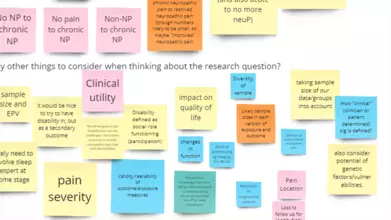
This research theme ("Work package 3") is focusing on psychosocial factors and how these relate to neuropathic pain. We use the term “psychosocial” to refer to things like a person's thoughts and feelings about pain, their mood, social support, and lifestyle and activities. We want to understand which psychosocial factors increase a person's risk for adverse outcomes like disability and distress related to neuropathic pain. We also want to understand the flip side of this—what psychosocial factors protect people from having poorer pain outcomes.
We have two key objectives:
- We want to improve assessment of psychosocial factors and make assessment more precise and more person-centred. This means that we want to ensure that our questionnaires measure what they intend to and capture experiences that are relevant to people with neuropathic pain. It's also important that our approach to the variables we study is non-pathologizing. This means that we recognize that the thoughts, feelings, and actions that people have in response to neuropathic pain are normal and understandable given the difficulties that can come with this pain. We also want to better capture how symptoms and psychosocial factors vary over time for individuals.
- We want to think more carefully about how to test potential causes of outcomes like disability and distress related to neuropathic pain. This means that we want to develop guidance for how researchers can be more explicit about their assumptions and more rigorously plan studies and analyse data. We then want to apply these principles to data collected within PAINSTORM.
Work planned
We advised on the selection of questionnaires to assess psychosocial factors that have been implemented into the PAINSTORM protocol across several different cohorts. We have several other streams of work/studies planned. These include:
- Cognitive interviews with people with and without pain to understand how they interpret items on a key measure of pain-related worry.
- A study to investigate what is measured by a widely used questionnaire of pain-related disability. Participants with and without pain will categorize a range of questionnaire items based on the variable that they think is being measured.
- An ecological momentary assessment study to track symptoms of neuropathic pain, emotions, and behaviours over time. This will involve people with neuropathic pain completing several brief questions multiple times per day over a few days.
- A systematic review to see what is actually measured in previous studies using ecological momentary assessment in people experiencing chronic pain. This involves a careful analysis of how the brief questions were developed and validated.
- We have performed a scoping review on how to best provide guidance to researchers to be more explicit about their causal assumptions, and how to visualise these in a graph (‘Directed Acyclic Graph'). Such practices may lead to a better design of studies and a more appropriate analysis of data. Relatedly, we developed a workshop to help researchers on these aspects.
Throughout the project, we are working with our colleagues across the consortium to ensure that we can optimize integration of biological and psychosocial data.
One focus of this work package is to better understand the causal relationships between the different psychosocial factors that influence pain. We have published papers on using Directed Acyclic Graphs (DAGs), which show these relationships:
- In this commentary, we encourage researchers to engage in causal thinking by using Directed Acyclic Graphs, which rely on expert knowledge rather than experimental data to reveal and display relationships between variables and outcomes: Lost without a cause: time to embrace causal thinking using Directed Acyclic Graphs (DAGs)
 . Recently, we published a review on how to develop DAGs: How to develop causal directed acyclic graphs for observational health research: a scoping review
. Recently, we published a review on how to develop DAGs: How to develop causal directed acyclic graphs for observational health research: a scoping review  .
. - In this article, we argue that there is room for improvement in how Big Data and machine learning techniques are used to study the effects of psychological factors on pain outcomes. In particular, there is a need to be more transparent about causal assumptions in research. This will lead to better research designs, more appropriate statistical analyses, and constructive discussions and productive tensions that improve our science: The effect of psychological factors on pain outcomes: lessons learned for the next generation of research.
You can find our study protocols on the PAINSTORM Open Science Framework page.
In the paper "Lost without a cause: time to embrace causal thinking using Directed Acyclic Graphs (DAGs)", we encourage researchers to use DAGs to explore causal relationships.
Geert Crombez is a professor of Health Psychology at Ghent University (Belgium), where he is co-leading the research group of Health Psychology. Foundational to this work is the idea that patients with chronic disorders are best conceived of as ‘normal individuals in abnormal situations', e.g. experiencing daily pain. He investigates how and why psychosocial factors may have an impact on pain, distress and disability, but also how we can help patients to adopt a healthy and active lifestyle.
Dr Whitney Scott is a Senior Lecturer in Clinical Health Psychology and a registered Clinical Psychologist. Whitney's work looks at the ways in which psychosocial factors relate to the experience and impact of pain. She is also interested in behavioural treatments to support people to reduce the impact of pain on their lives.
Annick De Paepe is a cognitive psychologist and statistician by training. Her research focuses on unravelling the psychosocial factors that can contribute to the development and maintenance of chronic pain. She is also interested in eHealth and how the use of eHealth can be used to increase self-management of several lifestyle factors, such as physical activity. Finally, she has a strong interest in methodology with a particular focus on single case experimental designs, causality and measurement.




